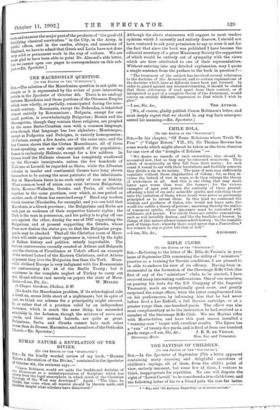EMILE ZOLA.
[To THZ EDITOR OF THE "SPECTATOR."] SIR,—In his chapter, "Of Some Relations whose Truth We Fear" (" Vulgar Errors," VII., 19), Sir Thomas Browne has some words which might almost be taken as the locus classical for one view of the "troughs of Zolaism " :— " We desire no records of such enormities ; sins should be accounted new, that so they may be esteemed monstrous. They admit of monstrosity as they fall from their rarity ; for men count it venial to err with their forefathers, and foolishly conceive they divide a sin in its society. The pens of men may sufficiently expatiate without these singularities of villany ; for, as they in- crease the hatred of vice in some, so do they enlarge the theory of wickedness in all. And this is one thing that may make latter ages worse than were the former ; for the vicious examples of ages past poison the curiosity of these present, affording a hint of sin unto seducible spirits, and soliciting those unto the imitation of them, whose heads were never so perversely principled as to invent them. In this kind we commend the wisdom and goodness of Galen, who would not leave unto the world too subtle a theory of poisons ; unarming thereby the malice of venomous spirits, whose ignorance must be contented with sublimate and arsenic. For surely there are subtler venenations, such as will invisibly destroy, and like the basilisks of heaven. In things of this nature silence commendeth history : 'tis the veniable part of things lost; whereby there must never rise a Pancirollus,* nor remain in any register but that of hell."










































 Previous page
Previous page